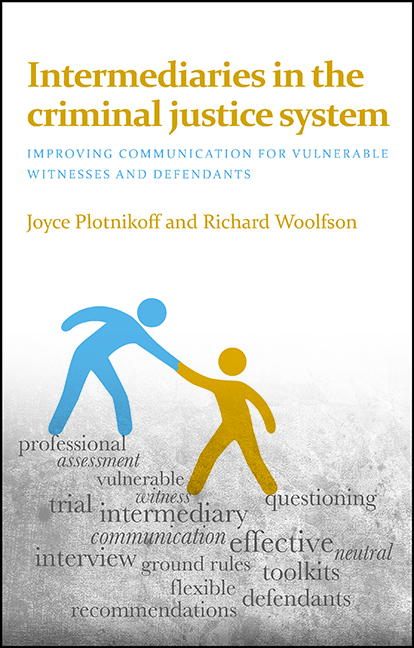 Intermediaries in the Criminal Justice System
Intermediaries in the Criminal Justice System Book contents
- Frontmatter
- Contents
- About the authors
- The Nuffield Foundation
- Acknowledgements
- Foreword
- one Introduction: a fresh pair of eyes
- two The intermediary scheme in England and Wales
- three Behind the scenes: planning to assess the witness
- four Assessment methods and involvement of the interviewer
- five Communication aids and stress reduction strategies
- six Contributing to the effectiveness of the police interview
- seven Negotiating professional space at the ground rules hearing
- eight Making the ground rules hearing effective
- nine ‘Every reasonable step’: preparation for giving evidence
- ten Cross-examination: research, case law, training and regulation
- eleven Cross-examination: intervention at trial
- twelve Cross-examination: challenges at the cutting edge
- thirteen The uneasy position of vulnerable defendants
- fourteen A new profession
- fifteen Conclusion
- References
- Index
- Table of cases
- Legislation
- Rules
- Practice directions
one - Introduction: a fresh pair of eyes
Published online by Cambridge University Press: 08 March 2022
- Frontmatter
- Contents
- About the authors
- The Nuffield Foundation
- Acknowledgements
- Foreword
- one Introduction: a fresh pair of eyes
- two The intermediary scheme in England and Wales
- three Behind the scenes: planning to assess the witness
- four Assessment methods and involvement of the interviewer
- five Communication aids and stress reduction strategies
- six Contributing to the effectiveness of the police interview
- seven Negotiating professional space at the ground rules hearing
- eight Making the ground rules hearing effective
- nine ‘Every reasonable step’: preparation for giving evidence
- ten Cross-examination: research, case law, training and regulation
- eleven Cross-examination: intervention at trial
- twelve Cross-examination: challenges at the cutting edge
- thirteen The uneasy position of vulnerable defendants
- fourteen A new profession
- fifteen Conclusion
- References
- Index
- Table of cases
- Legislation
- Rules
- Practice directions
Summary
Picture this.
A police officer is attempting to interview a three-year-old girl to see whether any offence has been committed against her. The person sitting alongside the officer and the child is an intermediary, an independent communication specialist. In an assessment session, the intermediary explores the child’s level of communication. The child is invited to draw herself and her mother, also present. The intermediary checks that the drawings have a stable identity in the child’s mind by making a deliberate naming error. The child is consistent about ‘who is who’. An hour later, in the police interview, the child begins drawing her uncle by marking with her crayon in the middle of the page. She says “uncle’s cock” twice, though the intermediary and officer are initially unsure they have heard her correctly. The girl says it again. She continues to draw, adding a little figure between her uncle’s legs that she identifies as herself. The police search her uncle’s computer which contains thousands of pornographic pictures of young children. He pleads guilty to this and to offences against his niece so she is not required to give evidence at trial.
Officers visit a house and find a young woman who has been kept in virtual slavery. She is deaf and has had no exposure to language or education. An intermediary, deaf himself, works with her over 10 sessions to build rapport and create a method of communicating with her. The police, who are always present, go on to film 14 interviews with the young woman, assisted by the intermediary, in which she gradually discloses rape and other offences. At trial, where her communication is facilitated by the intermediary, she gives evidence over many days. The defendant receives a lengthy sentence.
A 10-year-old girl arrives at school and the teacher sees a bite mark on her upper arm. The child has moderate learning difficulties and poor language skills; she has a low level of understanding, poor articulation and is generally unwilling to speak. When questioned about the bite mark, the girl just says “mummy”. An intermediary is asked to assess her.
- Type
- Chapter
- Information
- Intermediaries in the Criminal Justice SystemImproving Communication for Vulnerable Witnesses and Defendants, pp. 1 - 6Publisher: Bristol University PressPrint publication year: 2015


